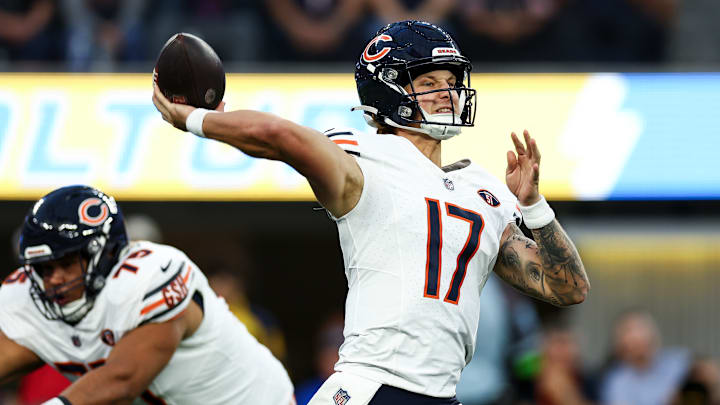The Chicago Bears went from being on the fun side of a blowout to the worst end. Last week, the Bears beat the Raiders 30-12. This week, they were embarrassed and lost 30-13 to the Chargers. Leading up to this game, there was an entire social media war amongst Bears fans debating who is a better quarterback for this team -- Justin Fields or Tyson Bagent. The debate was a little ridiculous but here we are and now we know.
Although, we might not know what you think. Tyson Bagent was never the answer. He's an undrafted free agent out of Division II. He has already proven he's a solid backup quarterback. We also shouldn't put a ceiling on him. There's no reason he cannot amount to more. That said, he was never more talented than Justin Fields at this point. This isn't the point though. I'm not here to debate Bagent and Fields. If that's the case, then what did Tyson Bagent prove?
The Chicago Bears are short in two main areas
Before we get into what Tyson Bagent proved tonight. Let's take a quick look at the outcome of his performance. Bagent started the game out by hitting Darnell Mooney on a deep pass that went for 41 yards. Chicago followed that up with two runs that went nowhere, then a sack for a 10-yard loss that took them out of field goal range. Not a great finish after an impressive start. Bagent had another deep ball, not thrown well, to a wide-open Velus Jones. Despite a poor, underthrown ball, Jones dropped an easy touchdown. Bagent played very up and down all game. He looked like a backup.
Overall, the Bears and Chargers had a similar time of possession. Chicago turned the ball over twice -- both were interceptions. The second one wasn't on Tyson Bagent though as it hit Darnell Mooney in the chest but he couldn't hang on as he got it. It bounced right into the Derwin James' hands for the pick. Bagent got lucky on a few other passes that he telegraphed that should have been picked off.
The defense was not efficient. Despite the teams having similar time of possession, the Chargers converted 53% of their third downs. That number improved at the end of the game, but at one point the Chargers converted 5 of 6 third downs. It's partly how they extended drives and went up 17-0 early in the game. It seemed as though the DBs were playing too soft and as usual the defensive front could not bring enough pressure. So many things went wrong in this game, but again, we at least were able to see two things brought to light.
